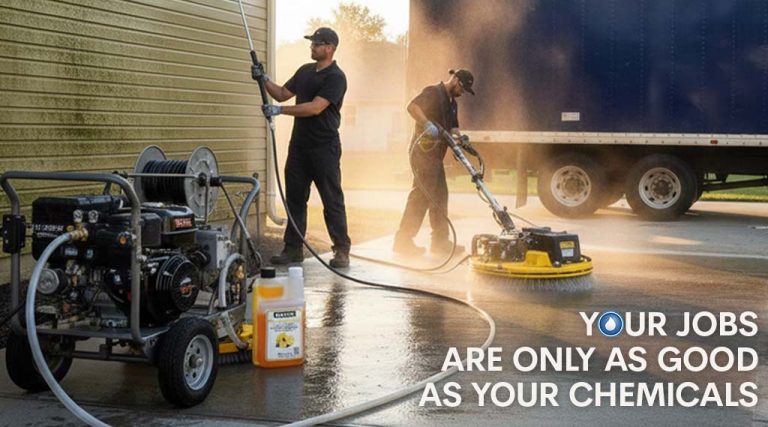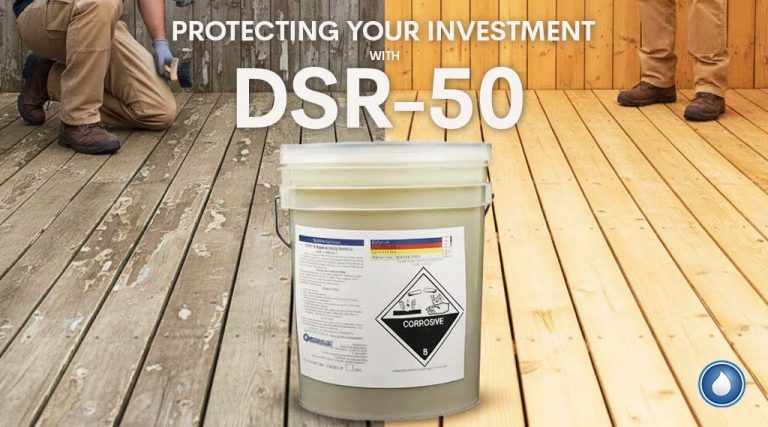By cleaning your customers’ sidewalks, driveways, and other walking traffic areas, you are doing more than keeping their establishments looking good. You are possibly protecting your customers from potential slip and fall lawsuits, the most common personal injury lawsuits in the United States. If your clients don’t seem to want to schedule regular cleanings, you can share this information with them and perhaps change their mind.
CNA insurance reported that people slip and fall on property for five major reasons:
-
- Lack of slip resistance on walking surfaces (i.e.: no mats in a restaurant kitchen)
-
- Poor walking surface conditions (i.e.: uneven surfaces, snow and ice, etc.)
-
- Poor visibility (i.e.: no lighting in a parking lot)
-
- Lack or poor condition of handrails and guardrails
-
- Poor accessibility
Power washers help clients avoid poor walking surface conditions by cleaning off grease, oils, accumulation of sand and dirt, and other kinds of deposits from often-used surfaces. Consistent cleaning makes working conditions and public use safer, perhaps the most important reason for regular service. Injuries from falling can lead to permanent disabilities and even death, specifically for the elderly.
How common are these kinds of incidents? Russell J. Kendzior writes in his book Falls Aren’t Funny: America’s Multi-Billion Dollar Slip-and-Fall Crisis that:
-
- Approximately 25,000 people a day are victims to slip-and-fall accidents. The expense of these injuries is running $3.5 million per hour, every hour of the day, every day of the year. That’s over $30 billion per year.
-
- The average cost of a slip-related injury exceeds $12,000.
-
- The average cost to defend a slip-and-fall lawsuit is $50,000.
-
- Plaintiffs win 51% of premises liability claims.
Someone who is injured from a fall can sue under Premise Liability Law, “the legal principles that hold landowners and tenants responsible when someone enters onto their property and gets hurt due to a dangerous condition. With few exceptions, premises liability claims are based on negligence,” as described on Hg.com. The legal definition of negligence, according to the Legal Information Institute, is:
“A failure to behave with the level of care that someone of ordinary prudence would have exercised under the same circumstances. The behavior usually consists of actions, but can also consist of omissions when there is some duty to act.”
In other words, the plaintiff must prove that the defendant did not act at a level of care that would keep the ground or floors from being hazardous. Regular cleanings might be considered “behaving with a level of care” by someone with “ordinary prudence.” It certainly would be better than risking no cleanings at all.
To confuse matters some, several power washing-related websites post the following statement with regard to approaching clients about keeping floors safe:
“According to OSHA and The American Disabilities Act (sic): Passed by Congress in July 1992,Title III notes: For all business open to the public, flooring and walkways should have a friction coefficient of .60 or above and ramps should have a friction coefficient of .80 or above. There are penalties for failure to comply (up to $50K first offense) and tax benefits for businesses that take steps to comply.”
When checked against OSHA guidelines and the Americans With Disabilities Act, this statement is incorrect. Juan Rodriguez, Deputy Regional Director of the U.S. Department of Labor, Office of Public Affairs confirmed that the above statement “is not a paragraph from OSHA.” The actual guidelines state:
“28 CFR 1910.141 (a)(3)(ii) The floor of every workroom shall be maintained, so far as practicable, in a dry condition. Where wet processes are used, drainage shall be maintained and false floors, platforms, mats, or other dry standing places shall be provided, where practicable, or appropriate waterproof footgear shall be provided.”
OSHA regulations do not mandate specific floor friction coefficients. OSHA has made only recommendations based on a study done on floor slippage. To another point, OSHA and the Americans With Disabilities Act are not related. OSHA is an agency of the Department of Labor while the ADA is a law enforced by The United States Department of Justice. With regard to flooring, the ADA states:
“The Occupational Safety and Health Administration recommends that walking surfaces have a static coefficient of friction of 0.5. A research project sponsored by the Architectural and Transportation Barriers Compliance Board (Access Board) conducted tests with persons with disabilities and concluded that a higher coefficient of friction was needed by such persons. A static coefficient of friction of 0.6 is recommended for accessible routes and 0.8 for ramps.”
It goes on to explain that friction coefficients vary and that builders are encouraged to use materials that fall within the recommended range.
Again, no coefficient of friction is mandated – hence, no penalty. Lastly, and most important to those cleaning floors, power washers are not part of the material selection process. The friction coefficient of the flooring purchased is up to the builders.
If you are considering selling floor cleaning services based on safety, simply inform your clients of the prevalence of people suing when they fall and that it is always better to be safe than sorry.



